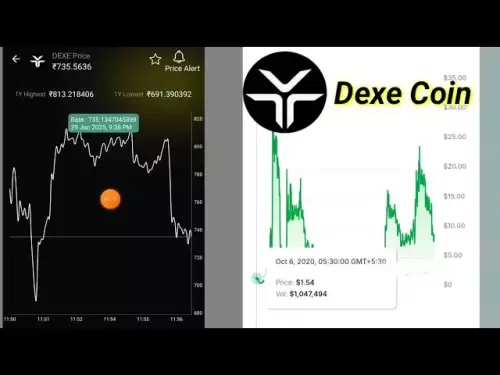-
 Bitcoin
Bitcoin $108,165.4587
0.78% -
 Ethereum
Ethereum $2,456.3517
1.15% -
 Tether USDt
Tether USDt $1.0003
0.00% -
 XRP
XRP $2.1934
0.05% -
 BNB
BNB $650.0935
0.52% -
 Solana
Solana $151.3905
2.69% -
 USDC
USDC $0.9998
0.00% -
 TRON
TRON $0.2751
-0.32% -
 Dogecoin
Dogecoin $0.1640
0.87% -
 Cardano
Cardano $0.5631
0.57% -
 Hyperliquid
Hyperliquid $38.7115
4.69% -
 Bitcoin Cash
Bitcoin Cash $493.1868
-0.39% -
 Sui
Sui $2.8217
3.61% -
 Chainlink
Chainlink $13.3994
2.08% -
 UNUS SED LEO
UNUS SED LEO $9.1632
0.94% -
 Avalanche
Avalanche $18.0318
1.97% -
 Stellar
Stellar $0.2388
0.35% -
 Toncoin
Toncoin $2.8763
1.41% -
 Shiba Inu
Shiba Inu $0.0...01160
1.59% -
 Litecoin
Litecoin $86.6393
1.29% -
 Hedera
Hedera $0.1485
0.16% -
 Monero
Monero $315.7948
1.56% -
 Polkadot
Polkadot $3.4240
1.88% -
 Bitget Token
Bitget Token $4.6314
-0.44% -
 Dai
Dai $0.9998
-0.01% -
 Ethena USDe
Ethena USDe $1.0002
-0.01% -
 Uniswap
Uniswap $7.2110
2.59% -
 Aave
Aave $270.6087
6.07% -
 Pi
Pi $0.5350
0.52% -
 Pepe
Pepe $0.0...09545
1.26%
Do DeFi wallets require KYC authentication?
DeFi wallets vary in KYC requirements: some prioritize user anonymity, while others implement KYC for compliance and security, affecting privacy and user experience.
Apr 03, 2025 at 09:36 am
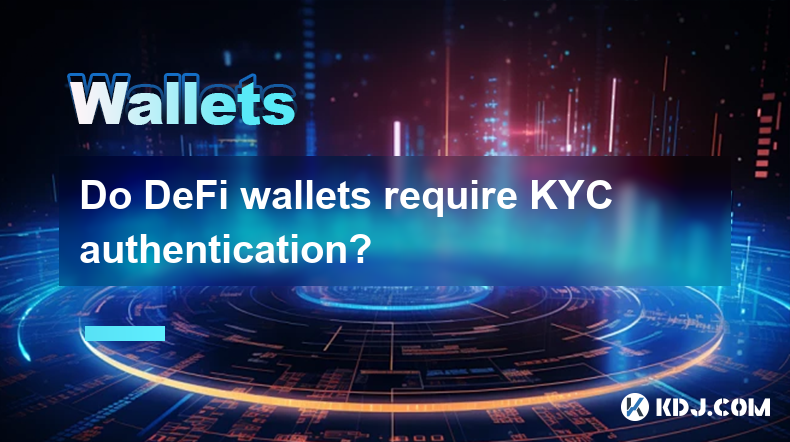
In the world of decentralized finance (DeFi), the question of whether wallets require Know Your Customer (KYC) authentication is a common concern for users seeking privacy and security. DeFi wallets, which are essential tools for interacting with decentralized applications and managing digital assets, vary in their approach to KYC. Some DeFi wallets prioritize user anonymity and do not require KYC, while others may implement KYC procedures to comply with regulatory standards or to enhance security measures. Understanding the nuances of KYC in DeFi wallets is crucial for users to make informed decisions about their financial privacy and security.
What is KYC and Why is it Important in DeFi?
KYC, or Know Your Customer, is a process used by financial institutions to verify the identity of their clients. In the context of DeFi, KYC is important for several reasons. Firstly, it helps prevent fraud and money laundering by ensuring that users are who they claim to be. Secondly, KYC can be a requirement for compliance with regulatory standards in certain jurisdictions. While DeFi aims to be decentralized and free from traditional financial oversight, some platforms may still choose to implement KYC to mitigate risks and comply with legal obligations.
DeFi Wallets Without KYC
Many DeFi wallets prioritize user privacy and do not require KYC authentication. These wallets are often favored by users who value anonymity and want to avoid sharing personal information. Examples of DeFi wallets that do not require KYC include:
- MetaMask: A popular browser extension wallet that allows users to interact with Ethereum-based decentralized applications without any KYC requirements.
- Trust Wallet: A mobile wallet that supports a wide range of cryptocurrencies and does not require KYC for basic usage.
- Argent: A user-friendly wallet for Ethereum and other tokens that does not require KYC for account creation and basic transactions.
These wallets typically allow users to create accounts and manage their assets without providing any personal information, aligning with the ethos of decentralization and privacy in DeFi.
DeFi Wallets with KYC
On the other hand, some DeFi wallets do implement KYC procedures. These wallets may require users to submit personal information and undergo identity verification before they can access certain features or higher transaction limits. Examples of DeFi wallets that may require KYC include:
- Coinbase Wallet: While Coinbase Wallet itself does not require KYC, users may need to complete KYC if they want to link their wallet to their Coinbase account for certain features.
- Binance Chain Wallet: Users may need to complete KYC to access certain features on the Binance platform, which can be linked to the Binance Chain Wallet.
- Crypto.com DeFi Wallet: This wallet may require KYC for certain advanced features and higher transaction limits.
The implementation of KYC in these wallets is often driven by the need to comply with regulatory requirements and to enhance security measures, particularly for users who engage in high-value transactions or use advanced features.
The Impact of KYC on User Privacy
The requirement of KYC in DeFi wallets can have significant implications for user privacy. When a wallet requires KYC, users must provide personal information, which can be stored and potentially accessed by third parties. This can be a concern for users who value their privacy and want to maintain anonymity in their financial transactions. On the other hand, wallets that do not require KYC allow users to maintain their privacy and avoid sharing personal information, aligning with the principles of decentralization and user autonomy in DeFi.
Balancing Privacy and Security
The decision to use a DeFi wallet with or without KYC often comes down to a balance between privacy and security. Wallets without KYC offer greater privacy but may be more vulnerable to fraud and other risks. Conversely, wallets with KYC may offer enhanced security and compliance with regulatory standards but at the cost of user privacy. Users must weigh these factors and consider their own priorities when choosing a DeFi wallet.
Regulatory Considerations
Regulatory considerations play a significant role in the implementation of KYC in DeFi wallets. In some jurisdictions, financial institutions and platforms are required to implement KYC procedures to comply with anti-money laundering (AML) and counter-terrorism financing (CTF) regulations. DeFi platforms that operate in these jurisdictions may choose to implement KYC to avoid legal repercussions and to maintain a positive relationship with regulators. However, the decentralized nature of DeFi can make it challenging to enforce KYC across all platforms and wallets.
User Experience and KYC
The user experience can also be affected by the presence or absence of KYC in DeFi wallets. Wallets without KYC typically offer a more streamlined and user-friendly experience, as users can create accounts and start using the wallet without any additional steps. On the other hand, wallets with KYC may require users to go through a verification process, which can be time-consuming and may deter some users. The choice between a wallet with or without KYC can impact the overall user experience and the ease of use of the wallet.
Future Trends in DeFi and KYC
As the DeFi space continues to evolve, the role of KYC in DeFi wallets may change. Some platforms may choose to implement more robust KYC procedures to comply with increasing regulatory scrutiny, while others may continue to prioritize user privacy and avoid KYC altogether. The future of KYC in DeFi will likely depend on a combination of regulatory developments, user preferences, and technological advancements. As the industry matures, finding a balance between privacy, security, and compliance will be crucial for the continued growth and adoption of DeFi.
Common Questions Related to DeFi Wallets and KYC
Q: What is the main difference between DeFi wallets that require KYC and those that do not?
A: The main difference is the level of user privacy and the compliance with regulatory standards. Wallets without KYC prioritize user anonymity and do not require personal information, while wallets with KYC require users to undergo identity verification to comply with regulations and enhance security.
Q: Can I use a DeFi wallet without KYC for all my transactions?
A: Yes, you can use a DeFi wallet without KYC for most transactions. However, some advanced features or higher transaction limits may require KYC on certain platforms.
Q: Are there any risks associated with using DeFi wallets without KYC?
A: Yes, there are risks such as increased vulnerability to fraud and money laundering. However, many users choose these wallets for their privacy benefits and take additional security measures to mitigate these risks.
Q: How does KYC affect the user experience in DeFi wallets?
A: KYC can make the user experience more cumbersome, as users need to go through a verification process. Wallets without KYC offer a more streamlined experience, but users must weigh this against potential security concerns.
Q: Will the requirement for KYC in DeFi wallets change in the future?
A: It is possible. As regulatory scrutiny increases, more DeFi platforms may implement KYC. However, the demand for privacy may also lead to the development of new solutions that balance compliance and user anonymity.
Disclaimer:info@kdj.com
The information provided is not trading advice. kdj.com does not assume any responsibility for any investments made based on the information provided in this article. Cryptocurrencies are highly volatile and it is highly recommended that you invest with caution after thorough research!
If you believe that the content used on this website infringes your copyright, please contact us immediately (info@kdj.com) and we will delete it promptly.
- Cryptos, Web3, Growth: What's Hot in the Streets (and on the Blockchain) for 2025
- 2025-06-30 06:30:12
- XRPL Validator Vet Sets the Record Straight: XRP, Not Your Typical US-Based Crypto
- 2025-06-30 06:30:12
- BNB, Maxwell Fork, and BSC Mainnet: Navigating Speed, Stability, and Geopolitical Tides
- 2025-06-30 06:50:12
- Qubetics, Render, Cronos: The Altcoins Poised to Pop in the Next Bull Run
- 2025-06-30 06:54:04
- Web3 AI, Bitcoin Cash, and Cardano: Crypto's Rising Stars in 2025
- 2025-06-30 06:57:13
- Bitcoin, Exchanges, and Institutions: A New Era of Crypto Dynamics
- 2025-06-30 06:35:12
Related knowledge
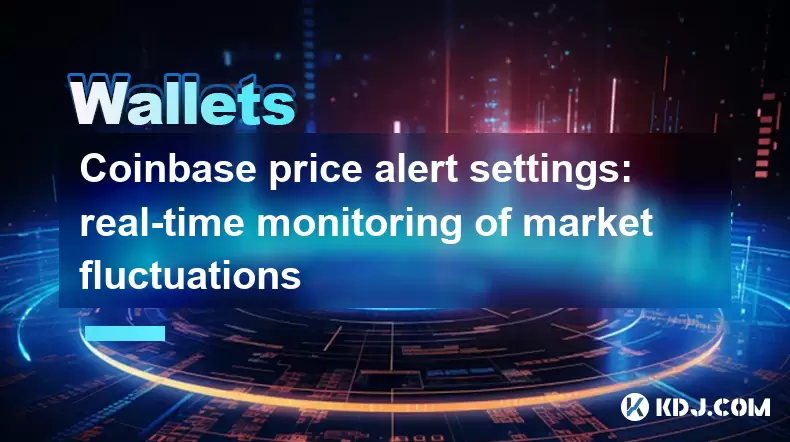
Coinbase price alert settings: real-time monitoring of market fluctuations
Jun 29,2025 at 07:00am
Setting Up Coinbase Price AlertsTo begin real-time monitoring of market fluctuations on Coinbase, users can utilize the built-in price alert feature. This function allows you to receive notifications when a cryptocurrency reaches a specific price point. To access this setting, open the Coinbase app or log in via the web platform. Navigate to the 'Prices...

How to stake cryptocurrencies on Coinbase? Benefits and risks
Jun 27,2025 at 06:36pm
Understanding Cryptocurrency Staking on CoinbaseStaking cryptocurrencies involves locking up digital assets to support the operations of a blockchain network, typically in return for rewards. Coinbase, one of the most popular cryptocurrency exchanges globally, offers staking services for several proof-of-stake (PoS) coins. Users can stake their holdings...
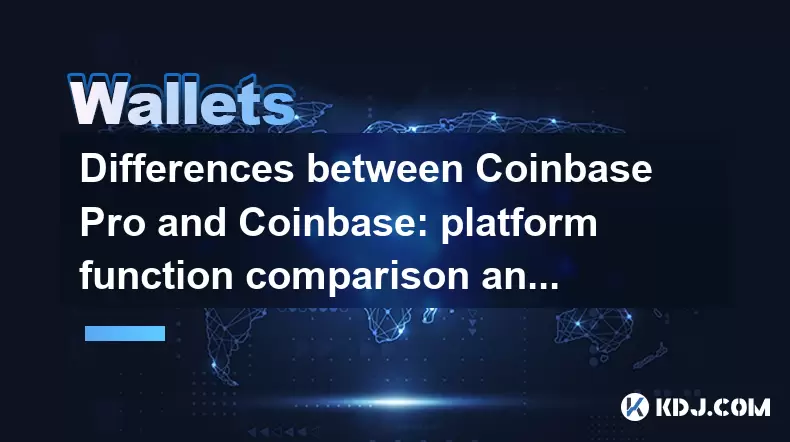
Differences between Coinbase Pro and Coinbase: platform function comparison and analysis
Jun 29,2025 at 08:21am
Overview of Coinbase and Coinbase ProWhen exploring the cryptocurrency trading landscape, users often encounter two platforms under the same parent company: Coinbase and Coinbase Pro. While both are operated by the same organization, they cater to different types of users and offer varying features. Coinbase is primarily designed for beginners and casua...
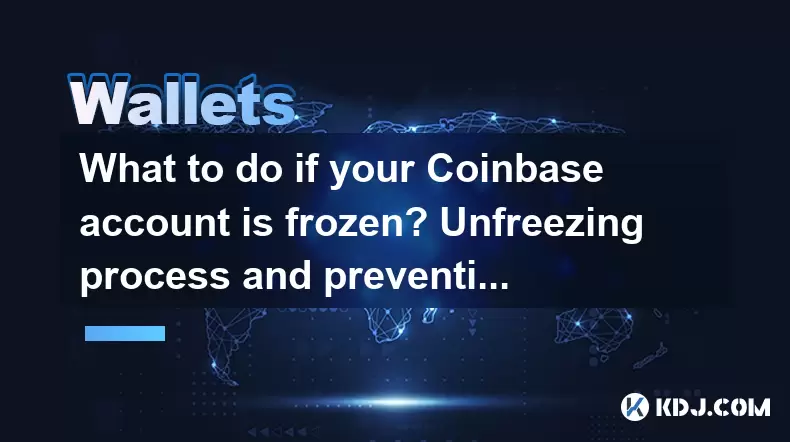
What to do if your Coinbase account is frozen? Unfreezing process and preventive measures
Jun 30,2025 at 03:49am
Understanding Why Your Coinbase Account Might Be FrozenIf your Coinbase account is frozen, it typically indicates that the platform has detected suspicious activity or potential violations of its terms of service. This could be due to a variety of reasons such as unusual login attempts, high-risk transactions, or incomplete verification steps. Coinbase ...

How to contact Coinbase customer service? Support channels and response times
Jun 28,2025 at 01:29pm
Contacting Coinbase Customer Service: Support Channels and Response TimesIf you're a user of Coinbase, reaching their customer service team may become necessary for various reasons, such as account verification issues, transaction disputes, or technical difficulties. Understanding the different support channels available and what to expect in terms of r...

Coinbase advanced trading function usage tutorial: limit orders and market orders
Jun 28,2025 at 09:07pm
Understanding the Difference Between Limit Orders and Market OrdersWhen using Coinbase's advanced trading features, it is crucial to understand the fundamental difference between limit orders and market orders. A market order executes immediately at the best available price on the market. This type of order ensures that your trade goes through quickly, ...

Coinbase price alert settings: real-time monitoring of market fluctuations
Jun 29,2025 at 07:00am
Setting Up Coinbase Price AlertsTo begin real-time monitoring of market fluctuations on Coinbase, users can utilize the built-in price alert feature. This function allows you to receive notifications when a cryptocurrency reaches a specific price point. To access this setting, open the Coinbase app or log in via the web platform. Navigate to the 'Prices...

How to stake cryptocurrencies on Coinbase? Benefits and risks
Jun 27,2025 at 06:36pm
Understanding Cryptocurrency Staking on CoinbaseStaking cryptocurrencies involves locking up digital assets to support the operations of a blockchain network, typically in return for rewards. Coinbase, one of the most popular cryptocurrency exchanges globally, offers staking services for several proof-of-stake (PoS) coins. Users can stake their holdings...

Differences between Coinbase Pro and Coinbase: platform function comparison and analysis
Jun 29,2025 at 08:21am
Overview of Coinbase and Coinbase ProWhen exploring the cryptocurrency trading landscape, users often encounter two platforms under the same parent company: Coinbase and Coinbase Pro. While both are operated by the same organization, they cater to different types of users and offer varying features. Coinbase is primarily designed for beginners and casua...

What to do if your Coinbase account is frozen? Unfreezing process and preventive measures
Jun 30,2025 at 03:49am
Understanding Why Your Coinbase Account Might Be FrozenIf your Coinbase account is frozen, it typically indicates that the platform has detected suspicious activity or potential violations of its terms of service. This could be due to a variety of reasons such as unusual login attempts, high-risk transactions, or incomplete verification steps. Coinbase ...

How to contact Coinbase customer service? Support channels and response times
Jun 28,2025 at 01:29pm
Contacting Coinbase Customer Service: Support Channels and Response TimesIf you're a user of Coinbase, reaching their customer service team may become necessary for various reasons, such as account verification issues, transaction disputes, or technical difficulties. Understanding the different support channels available and what to expect in terms of r...

Coinbase advanced trading function usage tutorial: limit orders and market orders
Jun 28,2025 at 09:07pm
Understanding the Difference Between Limit Orders and Market OrdersWhen using Coinbase's advanced trading features, it is crucial to understand the fundamental difference between limit orders and market orders. A market order executes immediately at the best available price on the market. This type of order ensures that your trade goes through quickly, ...
See all articles





















